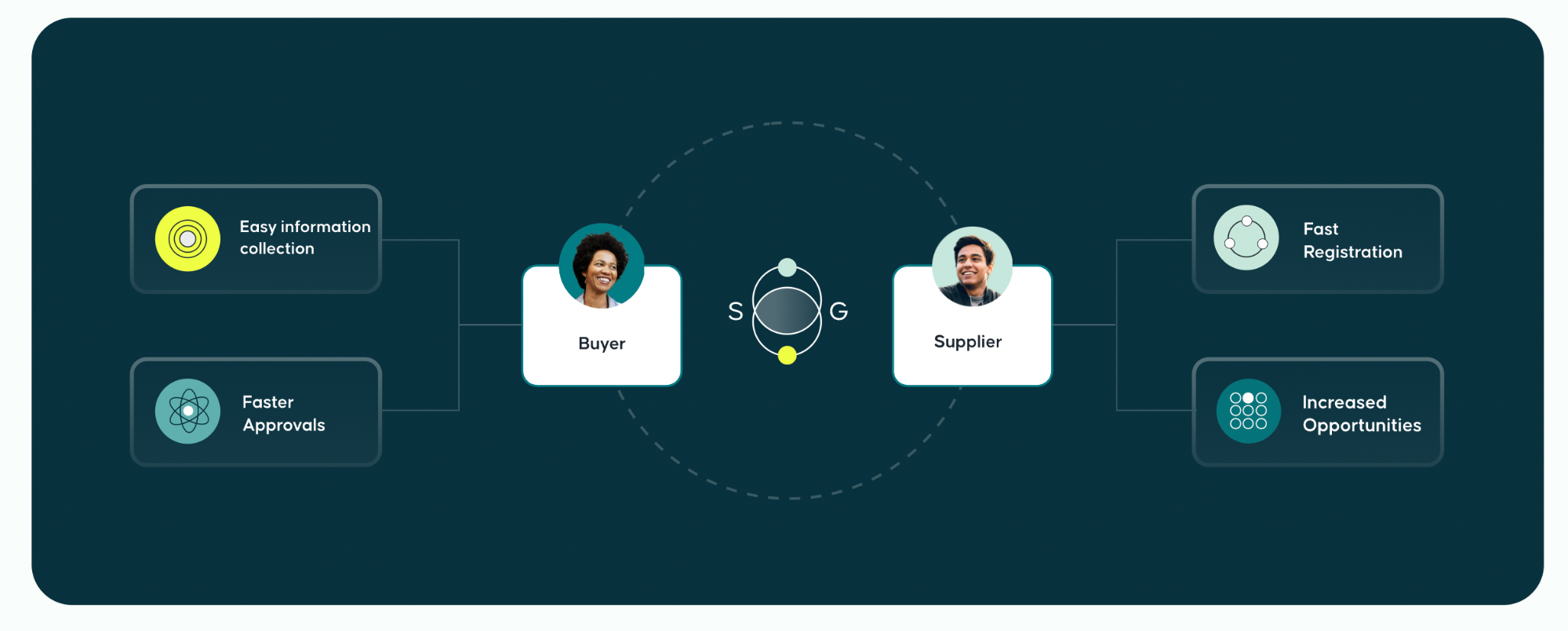It’s Monday morning. You’ve got a packed schedule and suddenly, another task gets added to your ever-growing mental to-do list: increase diversity spend by 20% within the next quarter. With a full day of meetings, vendor calls, and contract negotiations, the prospect of searching through numerous government directories and independent organizations to source verified and certified diverse suppliers is daunting.
Innovative, agile businesses understand the importance of supplier diversity, but time and budget constraints add another layer of pressure on busy procurement managers, often pushing diversity planning to the side. These four strategies can expedite and simplify your diverse supplier search, helping you fulfill company goals and streamline the evaluation and onboarding process.
What is a Diverse Supplier?
A diverse supplier is a business that is at least 51% owned, operated, and controlled by individuals from underrepresented or historically marginalized groups, including:
- Minority-owned
- Women-owned
- Veteran-owned
- LGBTQ+-owned
- Disability-owned
- Small businesses
These diverse businesses promote diversity and inclusion within supply chains and contribute to a more equitable economy. Working with diverse suppliers can also lead to:
- Increased innovation and creativity: diverse suppliers bring fresh perspectives to the table, which can result in new products, services, and solutions that better meet the needs of a diverse customer base.
- Access to new markets: partnering with diverse suppliers can provide businesses with access to new markets and demographics, leading to an increased market share and revenue growth.
- Enhanced reputation: commitment to supplier diversity can positively influence consumer perceptions, attract top talent, and strengthen relationships with stakeholders.
- Risk mitigation: diversifying the supply chain reduces dependency on a limited pool of suppliers, mitigating risks associated with disruptions such as natural disasters, geopolitical issues, or economic downturns.
Diverse suppliers can prove their status through a supplier diversity certification via a recognized third-party organization or through self-identification. In many corporate settings, supplier diversity initiatives require third-party certification for any expenditure or engagement, making it a more appealing option.
Challenges in Finding Diverse Suppliers
According to the 2020 Census, around 20% of all businesses are minority-owned. That means there are over 1.2 million potential diverse suppliers to choose from. This staggering number of options presents some sourcing obstacles:
- Limited visibility and accessibility: Diverse vendors may have less visibility in traditional supplier databases or directories, making it challenging for procurement teams to identify and connect with them.
- Capacity constraints: Some diverse businesses may have limited capacity to meet the volume or quality requirements of large companies.
- Verification and certification: Ensuring that diverse suppliers meet the same standards and qualifications as non-diverse suppliers can be challenging. Additionally, finding third-party certified diverse suppliers is time-consuming and complicated.
- Misconceptions and stereotypes: Procurement professionals may unintentionally exclude diverse suppliers based on preconceived notions about their capabilities, reliability, or quality.
While these considerations pose a challenge for procurement teams looking to increase diversity, they don’t have to be a barrier, with the right solutions.
4 Strategies for Finding Diverse Suppliers
Many conventional supplier directories lack a diverse supplier base or relevant information about their third-party certification status, making it difficult to find and gauge the right diverse partners. E-procurement platforms and diversity-related organizations facilitate and simplify this process.
1. E-procurement Platforms
E-procurement platforms, like supplier diversity management software, help organizations identify and connect with diverse suppliers, track and measure spend, and grow diversity programs with ease. SupplierGateway allows procurement professionals to manage their supplier diversity program with one user-friendly software.
Unlimited Data Enrichment makes it easy to discover diverse suppliers within your existing supply chain. You’ll also gain insights into which certifications your current suppliers hold, access the Diversity Confidence Index to find suppliers who are a perfect fit and have full control over search factors. From there, bolster your diverse supply chain with access to a database of local, diverse vendors through the Diverse Supplier Search.

SupplierGateway connects buyers and suppliers with ease.
Tracking and reporting tools allow you to effortlessly create a baseline to measure against so you can watch your diversity spending and program growth over time. Want to see how your partnerships impact local areas? Economic Impact Reporting uses the RIMS II model to calculate your company’s impact, from job creation to economic growth.
Add a layer of transparency to your organization’s corporate social responsibility with Project Diversity Reporting, a simple way to share diversity data and spend with clients and government agencies.
2. Supplier Diversity Organizations
Supplier diversity associations champion and advance supplier diversity efforts. They provide resources, assistance, and networking avenues for enterprises dedicated to cultivating Diversity, Equity & Inclusion (DEI) within their supply networks. Many underrepresented or historically marginalized groups have organizations, including:
- National Minority Supplier Development Council (NMSDC)
- Women’s Business Enterprise National Council (WBENC)
- National LGBT Chamber of Commerce (NGLCC)
- National Veteran-Owned Business Association (NaVOBA)
- US Pan Asian American Chamber of Commerce (USPAACC)
These organizations often host in-person and digital events, webinars, and community projects and can be a good starting place for learning about and cooperating with diverse suppliers.
3. Government Directories
Government directories like the Small Business Administration (SBA) and the Minority Business Development Agency (MBDA) primarily serve suppliers. They can be instrumental in providing legal and business guidance, issuing small loans, and educating business owners. They can be a good source of general data regarding diverse vendors and a platform to learn more about specific types of minority-owned businesses.
4. Supplier Diversity Conferences and Events
In-person events held by various organizations and institutes are an excellent way to find diverse suppliers. They’re often geared towards specific industries, locations, or types of diverse suppliers, so narrowing down a suitable option for your needs may require some research. Some upcoming events include:
- Edison Electric Institute Business Diversity Conference in Atlanta (May 21 – 24, 2024)
- WBENC National Conference in New Orleans (June 23 – 26, 2024)
- NMSDC Annual Conference and Exchange in Atlanta (October 20 – 23, 2024)
- Edison Electric Institute Financial Conference in Hollywood, Florida (November 10 – 12, 2024)
Evaluating and Onboarding Diverse Suppliers
Supplier diversity shouldn’t come at the expense of quality. When selecting potential diverse suppliers, you’ll also need to evaluate them based on some critical factors:
- Certification: assess whether the supplier holds relevant diversity certifications recognized by industry standards or third-party organizations.
- Product or service quality: evaluate the quality, reliability, and consistency of the supplier’s products or services to ensure they meet your required standards.
- Competitive pricing: compare the supplier’s pricing structure with market rates to ensure competitiveness without compromising quality.
- Capacity and scalability: consider the supplier’s capacity to fulfill current and future orders while accommodating potential growth or expansion.
- Financial stability: assess the supplier’s financial health, including factors like liquidity, solvency, and creditworthiness, to minimize risks associated with instability.
- Compliance and ethics: Ensure vendors adhere to relevant laws, sustainability regulations, and ethical standards, including environmental, social, and governance (ESG) considerations.
Supplier onboarding can be a complex process when done manually, full of data silos, missing emails, and countless spreadsheets. A manual onboarding process can also put organizations at risk for compliance issues and impede smooth relationship-building with new vendors.
SupplierGateway streamlines the onboarding process, creating a transparent single source of information for your organization with centralized supplier data, custom onboarding experiences, risk management, and task automation.












